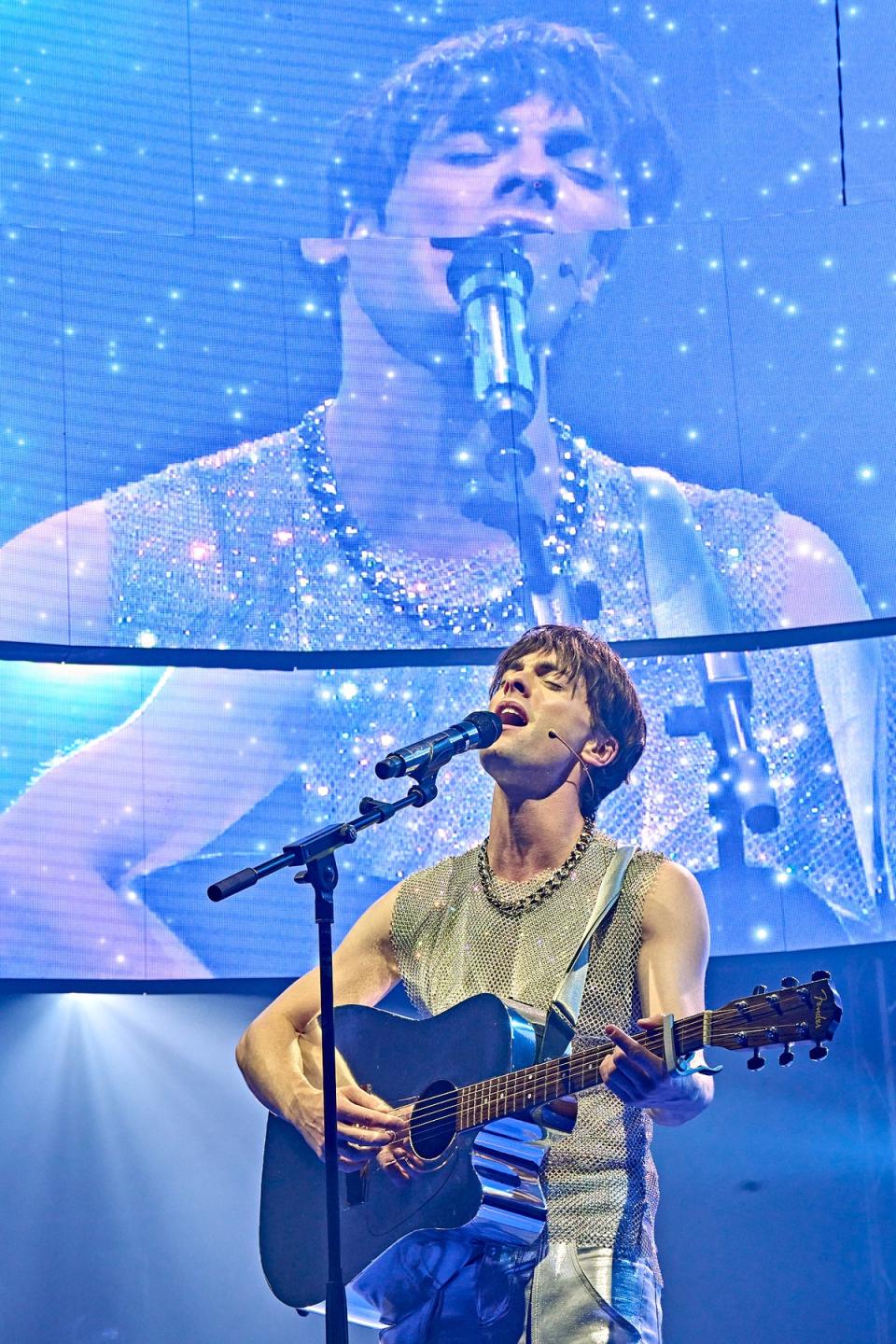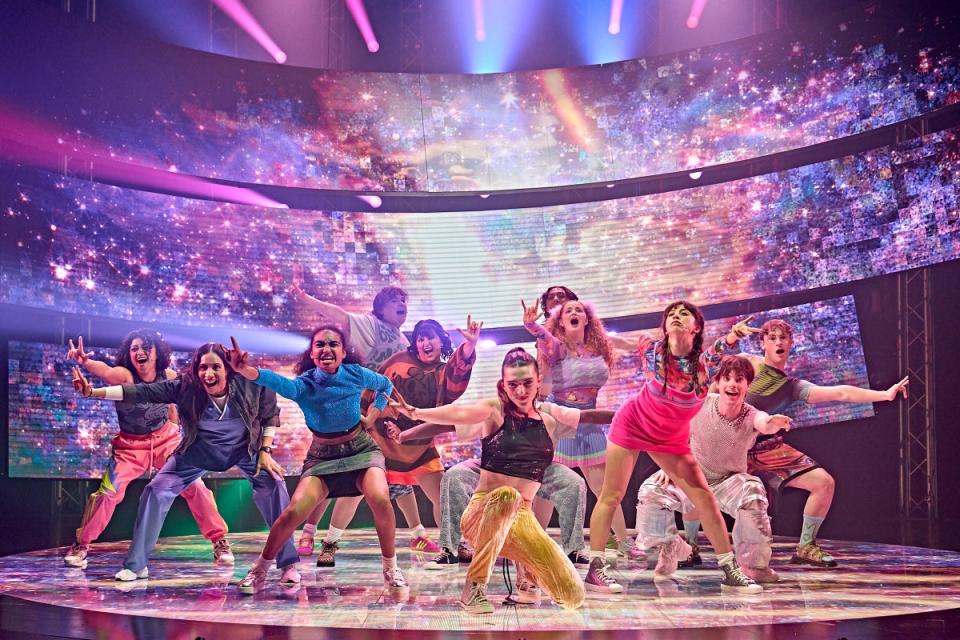If you’re still recovering from One Direction’s breakup eight years after the boy band split, you’re in luck. While the boys won’t be reuniting for a final tour for a while, the brand new London opening, Fangirls, might be the next best thing.
The musical, by Australian screenwriter Yve Blake, premiered in her home country in 2019 to rave reviews and won multiple awards, including a Sydney Theatre Award for Best Main Stage Production of a Musical. Now, a revamped, spiced-up version with a brand new cast (albeit still with the same Australian accent) is coming to London for a performance at the Lyric Hammersmith Theatre.
When Blake and I speak, she and the cast are nearly done with rehearsals: They’ve just finished a run-through of the show, which will transform the musical into a full-fledged pop concert. The new set features LED floor panels and “a production value beyond my wildest dreams.” Theater choreographer Ebony Williams, who has worked with artists including Rihanna and Beyonce, and choreographed Doja Cat’s world tour, is on board.
“What the f**k!” Blake exclaims. “I feel like the production that’s being put together in London is a brand new production and has been completely reinvented… I just feel like all these smart people are making my dream show. As a writer, you’re like a dad in a delivery room. There’s nothing you can do. I just sit there and cry some happy tears. That’s how I feel right now.”
Blake says the initial inspiration for Fangirls came from a real-life tragedy surrounding the boy band One Direction. In 2015, more or less out of the blue, Zayn Malik suddenly announced he was leaving the group, and Directioners—to give fans of the band their official title—went into mourning. Following the news, the phrase “I’M CRYING” was tweeted at a rate of four to six times per second, and fans coping with his departure was “a global news story,” Blake says.
“I was fascinated because I saw journalists reaching for the same words over and over again to refer to a group of One Direction fans that they assumed were mostly teenage girls,” Blake says. “The words they were reaching for were adjectives like crazy, psycho, hysterical, over the top, desperate, pathetic, a bit much. I wondered, would they use the same adjectives if they were reporting on an upset that had happened in male sports?”
While Fangirls takes some dark and surreal turns, with some satirical plot elements, at its core it’s a celebration of teenage fans, who are often belittled and underestimated. “They have so much cultural and economic power, teenage girls. I find it so ironic that people roll their eyes at them,” she says. “Why is it that when something is culturally beloved by teenage girls and people who aren’t men… why is it associated with this sense of shame and that it’s degrading and embarrassing? I feel like we’ve seen so much of that in the last year and a half with Taylor Swift’s tour. I don’t know how to feel about the fact that the show first premiered in 2019, but it still feels so prophetic.”

From there, the original idea for Fangirls was born, with the play informed by Blake’s own research. As well as learning about some of the weird and wonderful fan tributes – including a group of enterprising One Direction fans who quickly set up a plaque at the inconspicuous roadside spot where Styles threw up after a night out in 2014 – she was pleasantly surprised by the sense of community she found, beyond the immediate madness.
“I assumed this subculture would be about young women competing for the affections of a male idol,” she says. “But I quickly thought, oh no, this is actually a really beautiful space that’s about friendship, chosen family, and community.
“The more I looked into it, the more I learned about these healthy elements of it. I have to say, the show is not uncritical: it’s about what it means to worship a celebrity in 2024, and what that does to our brains. The show isn’t afraid to look at the darker elements of parasocial relationships. It’s interesting when you grow up in a world where you’re constantly seeing Instagram posts from your favorite celebrity, and you can comment on them with one tap and send them a message. It’s so interesting generationally that people are growing up with more and more perceived accessibility.”
The play centers on 14-year-old pop megafan Edna, who is obsessed with a hugely successful boy band called Heartbreak Nation, and in particular their lead heartthrob Harry. While his name may bring to mind a certain lead singer-turned-solo star, Blake insists that “he’s not Harry Styles. He’s this amazing salad of so many different ideas, of different pop stars. He’s a bit BTS, a bit Shawn Mendes, a bit Justin Bieber, a bit One Direction, a bit Taylor Swift.”
As other fans rush to secure tickets for Heartbreak Nation’s upcoming tour, Edna is equally fixated on a huge scandal she thinks she’s uncovered with a small circle of chronically online fans: Harry is secretly depressed and desperate to escape the spotlight, but his management is forcing him to stay in the band. Eager to help, Edna and her internet friend Saltypringl come up with a plan of action—and by the time the hiatus rolls around, things have taken a rather dark turn.


“The stakes are really, really high. In Act One, you have a 14-year-old girl and everything in her life feels like it’s life or death, because that’s what it feels like to be a teenager.” Blake decided it would be interesting to ramp up the drama in the second half accordingly. “It’s a show about extreme feelings, right? And why not take it to the extreme?”
In Australia, audiences have approached Fangirls like a stadium pop concert, with some even carrying homemade signs to wave at the fictional Heartbreak Nation. Blake is determined to ensure British audiences respond in a similarly “wild” way, and is keen to offer a raw, connected experience in theatre.
“I fell in love with theatre as a teenager, but I remember thinking, ‘Huh, I can’t imagine a world where I could take someone my age – who was 15 at the time – to the theatre.’ You have to sit there and be so polite. You’re not allowed to pee until it’s over. And you have to clap at the end, even if it’s good or bad. You have to be very still and quiet. Compare that to the energy of a performance where you’re allowed to sweat and scream, and there’s adrenaline….”
Many recent plays dealing with pop music, from Lucy Moss and Toby Marlow’s musical Six to the Max Martin-directed And Juliet, seem to want to evoke a similar mood.
“There seems to be a generation of theatre makers who are really interested in reimagining what theatre spaces can feel like. I think it’s really exciting. It can feel very elitist,” she says. “I often say that I made this show as a gift to my 14-year-old self.”
Fangirls runs at the Lyric Hammersmith Theatre until August 24